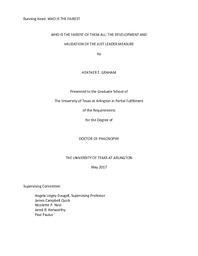
ATTENTION: The works hosted here are being migrated to a new repository that will consolidate resources, improve discoverability, and better show UTA's research impact on the global community. We will update authors as the migration progresses. Please see MavMatrix for more information.
Show simple item record
| dc.contributor.advisor | Liegey-Dougall, Angela | |
| dc.creator | Graham, Heather E. | |
| dc.date.accessioned | 2017-07-03T14:49:53Z | |
| dc.date.available | 2017-07-03T14:49:53Z | |
| dc.date.created | 2017-05 | |
| dc.date.issued | 2017-05-03 | |
| dc.date.submitted | May 2017 | |
| dc.identifier.uri | http://hdl.handle.net/10106/26790 | |
| dc.description.abstract | Much work has explored the dimensionality, antecedents and consequences of organizational justice; yet, the transfer of knowledge to application and intervention remains limited. The paper includes the development and validation of the Just Leader measure, a scale intended to assess individual differences in leaders’ tendencies to behave in ways that are likely perceived as fair and just. Building upon social-exchange theory and correlates associated with organizational justice, the Just Leader measure was theoretically derived from four main constructs: empathy, emotional intelligence, implicit person theory, and moral ideology. The development and validation of the measure spanned across two studies using three separate working-adult populations. The first study included a scenario-based design and demonstrated that empathy, two emotional intelligence facets and one facet of implicit person beliefs predicted interpersonal and informational justice perceptions. Unexpectedly, two additional emotional intelligence factors, as well as moral ideology did not demonstrate a predictive relationship with neither interpersonal nor informational justice. The second study further defined the dimensionality and item characteristics of the newly developed Just Leader measure. Item response theory and confirmatory factor analysis indicted the measure was best modeled by a four-factor structure. The Just Leader measure demonstrated adequate reliability, construct validity, and content validity. However, analysis on the third sample, comprised on boss-employee dyads, neglected to demonstrate criterion and incremental validity. Limitations and further measure refinement are discussed. | |
| dc.format.mimetype | application/pdf | |
| dc.language.iso | en_US | |
| dc.subject | Organizational justice | |
| dc.subject | Empathy | |
| dc.subject | Scale development | |
| dc.title | WHO IS THE FAIREST OF THEM ALL: THE DEVELOPMENT AND VALIDATION OF THE JUST LEADER MEASURE | |
| dc.title.alternative | WHO IS THE FAIREST | |
| dc.type | Thesis | |
| dc.degree.department | Psychology | |
| dc.degree.name | Doctor of Philosophy in Psychology | |
| dc.date.updated | 2017-07-03T14:52:01Z | |
| thesis.degree.department | Psychology | |
| thesis.degree.grantor | The University of Texas at Arlington | |
| thesis.degree.level | Doctoral | |
| thesis.degree.name | Doctor of Philosophy in Psychology | |
| dc.type.material | text | |
Files in this item
- Name:
- GRAHAM-DISSERTATION-2017.pdf
- Size:
- 3.982Mb
- Format:
- PDF
This item appears in the following Collection(s)
Show simple item record


